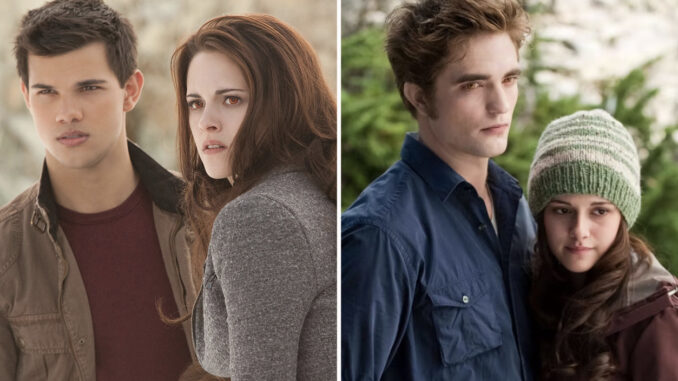
The Phantom Embrace: Twilight’s Almost-Reunion and the Enduring Echoes of Fandom
The world of fandom is a peculiar, powerful beast, capable of nurturing obsessions for decades, long after the last credits roll. Few phenomena exemplify this more vividly than Twilight. More than just a film series, it was a cultural lightning rod, sparking fervent debates, inspiring endless fan fiction, and igniting the hearts of a generation. So, when whispers and near-misses of a "reunion" began to circulate recently, it wasn't just news – it was an atmospheric event, sending ripples of exhilaration and longing through the dedicated legions of Twihards. Yet, this "reunion" was not the grand, red-carpet spectacle many dreamed of; it was a constellation of separate interviews and anniversary tributes, distinguished most notably by the conspicuous absence of its central stars. This phantom embrace, far from dulling the enthusiasm, only amplified the conversation, forcing fans and casual observers alike to confront the complex legacy of Twilight and the professional trajectories of those who brought its angsty romance to life.
The "reunion" that fans couldn’t stop talking about wasn't a singular, orchestrated event, but rather a series of serendipitous moments that created a palpable sense of near-convergence. It began with the 15th anniversary of the first film’s release, igniting a wave of nostalgic content. Then, the "Twilight Effect" podcast, hosted by director Catherine Hardwicke, began to roll out interviews with cast members, offering an intimate peek behind the scenes. Crucially, in a short span, both Robert Pattinson (Edward Cullen) and Kristen Stewart (Bella Swan) found themselves discussing their time on the films in major publications and podcasts, albeit separately. Pattinson, in a GQ interview, reflected on the immense, almost suffocating fame, while Stewart, in W Magazine and other outlets, offered more nuanced perspectives on her transformative role. These concurrent, yet independent, reflections created a collective gasp across the fandom: a moment where the stars aligned, offering glimpses into their past, almost touching, yet always just out of reach. For fans, it was like catching glimpses of rare birds in the same forest – not together, but undeniably present, their calls echoing through the familiar trees.
The reason these near-misses created such a frenzy lies deep within the enduring power of the Twilight fandom. For many, Twilight wasn't just a movie; it was a formative experience. It arrived at a time when supernatural romance was hitting its stride, captivating a demographic hungry for escapism and intense, all-consuming love stories. Team Edward vs. Team Jacob became a global phenomenon, akin to a friendly tribal allegiance. The films, despite critical ambivalence, tapped into a universal adolescent yearning for belonging, for a love so profound it transcended mortality, and for finding one's place in a world that often felt mundane. Fifteen years later, those adolescents have grown, but the indelible ink of Twilight remains on their hearts. The resurgence on streaming platforms, the explosion of Twilight-related content on TikTok, and the discovery by a new generation have only amplified this nostalgia. For these fans, the "reunion" (even an incomplete one) was a validation of their enduring love, a chance to revisit a simpler, more intensely felt past.
However, the very elements that fueled the reunion frenzy – the fervent love, the intense scrutiny, the cultural omnipresence – also precisely explain the "missing main cast" from any true, collective celebration. Robert Pattinson and Kristen Stewart, who bore the brunt of Twilight's supernova fame and the relentless public fascination with their real-life romance, have spent the better part of a decade carving out distinct and often challenging post-Twilight careers. For Pattinson, it meant a deliberate pivot to independent cinema, starring in critically acclaimed, art-house films like Good Time and The Lighthouse, before ascending to the cowl of Batman. Stewart, similarly, embraced indie projects, delivering captivating performances in films like Personal Shopper and eventually earning an Oscar nomination for Spencer.
Their absence from a grand, unified Twilight reunion is not a slight, but a testament to their artistic evolution and, perhaps, a necessary act of self-preservation. To perpetually return to their roles as Bella and Edward would risk typecasting, overshadowing their serious attempts to redefine themselves as versatile actors. Moreover, the personal toll of their Twilight-era fame was immense. Their relationship, dubbed "Robsten," was dissected with microscopic intensity, leaving little room for privacy or normalcy. Stepping back into that specific spotlight, together, would inevitably reignite the fan frenzy over their past relationship, eclipsing their current work and personal lives. For them, Twilight represents a pivotal, yet closed, chapter. They honored it by giving unforgettable performances, but the story concluded, and so, too, did their primary engagement with its public persona.
The "missing main cast," therefore, is not a failure of will but a logical consequence of ambition and self-preservation. It is a quiet declaration that while Twilight profoundly shaped their early careers, it does not define their entire artistic journey. The scattered reflections and individual interviews serve as a respectful nod to the past, acknowledging the phenomenon without being consumed by it. They offer, perhaps, a more authentic form of "reunion": a mature reflection from individuals who have grown exponentially since their vampire-romance days.
Ultimately, the Twilight reunion that fans can’t stop talking about, with its notable missing pieces, is more than just a news item; it's a poignant illustration of fandom's undying flame meeting the realities of celebrity, growth, and personal evolution. It highlights the enduring grip of nostalgia and the powerful, almost spiritual connection a generation formed with a fictional world. The absence of a complete reunion isn't a void, but rather a space that allows the original magic to linger, untainted by attempts to recapture what was. Twilight lives on, not necessarily through collective cast appearances, but through the vibrant, ever-evolving conversations of its fans, and the indelible mark it left on the culture, a mark whispered about by those who once walked among the vampires and werewolves of Forks.
